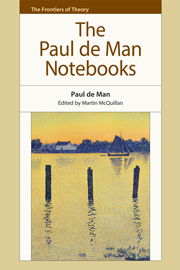Book contents
- Frontmatter
- Contents
- Series Editor's Preface
- Acknowledgements
- Dedication
- Introduction: ‘The Unimaginable Touch of Time’: The Public and Private in the Notebooks of Paul de Man
- PART I Texts
- 1 The Drawings of Paul Valéry (1948)
- 2 Jacques Villon (1952)
- 3 Graduate Essay on Keats (1954)
- 4 Postdoctoral Essay on Symbolism (c. 1960)
- 5 Introduction to Madame Bovary (1965)
- 6 Introduction to The Portable Rousseau (1973)
- 7 On Reading Rousseau (1977)
- 8 Translator's Introduction to “Rousseau and English Romanticism” (1978)
- 9 Rousseau and English Romanticism (1978)
- 10 Introduction to Studies in Romanticism (1979)
- 11 Hommage à Georges Poulet (1982)
- 12 A Letter from Paul de Man (1982)
- 13 Reply to Raymond Geuss (1983)
- 14 Interview with Robert Moynihan (1984)
- PART II Translations
- PART III Teaching
- PART IV Research
- Appendix. The Notebooks of Paul de Man 1963–83
- Bibliography
- Index of Names
9 - Rousseau and English Romanticism (1978)
from PART I - Texts
Published online by Cambridge University Press: 05 December 2014
- Frontmatter
- Contents
- Series Editor's Preface
- Acknowledgements
- Dedication
- Introduction: ‘The Unimaginable Touch of Time’: The Public and Private in the Notebooks of Paul de Man
- PART I Texts
- 1 The Drawings of Paul Valéry (1948)
- 2 Jacques Villon (1952)
- 3 Graduate Essay on Keats (1954)
- 4 Postdoctoral Essay on Symbolism (c. 1960)
- 5 Introduction to Madame Bovary (1965)
- 6 Introduction to The Portable Rousseau (1973)
- 7 On Reading Rousseau (1977)
- 8 Translator's Introduction to “Rousseau and English Romanticism” (1978)
- 9 Rousseau and English Romanticism (1978)
- 10 Introduction to Studies in Romanticism (1979)
- 11 Hommage à Georges Poulet (1982)
- 12 A Letter from Paul de Man (1982)
- 13 Reply to Raymond Geuss (1983)
- 14 Interview with Robert Moynihan (1984)
- PART II Translations
- PART III Teaching
- PART IV Research
- Appendix. The Notebooks of Paul de Man 1963–83
- Bibliography
- Index of Names
Summary
The problem of Rousseau's presence within English Romanticism, especially among the major poets, which is to say Coleridge, Wordsworth, Blake, Keats, and Shelley, has been treated by traditional comparative literature as a simply historical question. It has been treated, that is to say, at the level of so-called general ideas, idées reçues, and commonplaces to which the history of ideas sometimes risks sacrificing the complexity of readings. The works that treat the question are few, especially in the English and German realms, where the reading of Rousseau continues to come up against some very deeply entrenched prejudices. The already mentioned works by Roddier and Voisine, both of which are dedicated to the excellent literary historian and friend of Jean Wahl, J. M. Carré, still provide the best inventories of the question and, along with Joseph Texte's book, a catalogue of the idées reçues concerning it.
The question immediately comes up against a considerable difficulty of reading. The main Romantic text where Rousseau appears in his own name presents a daunting challenge to the reader. Rousseau's presence is not inconsiderable but remains allusive and implicit in Wordsworth's Prelude, where it is often the educational theme of Emile that comes into play and where the oft cited analogy between the interiority and retrospective temporality of the autobiographical narratives, The Prelude and The Confessions, is so general that it cannot amount to more than a simple suggestion.
- Type
- Chapter
- Information
- The Paul de Man Notebooks , pp. 107 - 125Publisher: Edinburgh University PressPrint publication year: 2014



